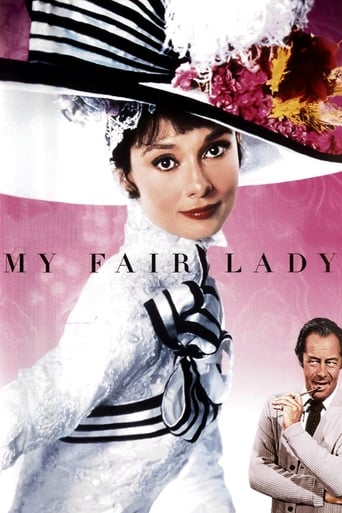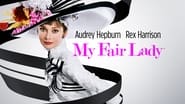merelyaninnuendo
My Fair Lady2 And A Half Out Of 5My Fair Lady is a character driven musical drama that is all distraction to make it glorifying and instead leaves the audience none wiser at the end of curtain. Even though their lies a greater and layered concept among all the traffic in the feature, it also walks on a wafer thin premise for the most part of it, which is never going to make to the "pros" section no matter how hard the makers try. It is short on technical aspects like editing, cinematography and choreography but is rich on the background score, costume, production and art design. The camera work is stunning and is shot beautifully with a pleasing environment and palpable tone for the audience. The screenplay by Alan Jay Lerner is adaptive and thought-provoking if not gripping and smart as it seems. George Cukor; the director, has done an appreciative job but isn't good enough to create an impactful emotion on to the audience as aspired. The performance is plausible by Audrey Hepburn and Rex Harrison and is supported decently by Stanley Holloway and Gladys Cooper. My Fair Lady is a bit edgy but fair, an overstretched but worth and finely detailed but not elaborative that usually helps keep the audience engaged in it.
davidallen-84122
I have never minded dubbing in musical films but why not be honest enough to credit the real singers,on both the opening titles and the record covers ? Marni Nixon's voice was so true and lyrical (I could listen to her all day). She really illuminated the performances of Deborah Kerr and Natalie Wood and did the same for Audrey Hepburn in "My Fair Lady". Watching Audrey perform to her own vocals on YouTube,I felt suddenly let-down by the dull,lifeless sound;in turn,ruining the visuals.They retained most of Audrey's own voice for 'Just You Wait' and I thought the number was ponderous and wrong (the dream aspect hardly helped either).As soon as Marni's lilting soprano could be heard on the soundtrack, Audrey's performance was elevated too.Those ''stars" Marni Nixon sang for should have been grateful to her;she must have been a really nice,self-effacing person.One final point that needs clearing up:Walt Disney told Julie Andrews that he would postpone the filming of "Mary Poppins" if she was given the chance to play Eliza on screen.There would still have been time for her to do "The Sound Of Music" as well.As they say:"That's Hollywood".
pyrocitor
"Your ending is damnable; you ought to be shot!" So boomed George Bernard Shaw, upon witnessing the ending of Pygmalion, his slashing satire of class and gender disparities, changed from its original intent. In Shaw's words, leading lady Eliza Doolittle ended the play by proudly walking out on Professor Henry Higgins, her sneering tutor. To Shaw's chagrin, subsequent performances had twisted the climax into a more populist, albeit disingenuously romantic, 'happy ending.' Flash-forward forty years, by the time My Fair Lady, the filmic revival of the now beloved Broadway musical, was released, audiences would have expected nothing less. And yet, for a show heralded as "the perfect musical," it's startling how, nostalgic haze aside, how many of the film's attributes have aged poorly to the point of being resoundingly un-fair - none the least, that 'damnable' ending itself. This isn't to say that the film is worthy of the kind of lambasting Higgins bestows upon Eliza, upon first glimpsing her in her unrefined, working class inelegance (ahh, romance). Granted, for one of the defining directors of the Classical Hollywood screwball era, George Cukor's work here is thoroughly sleepy, with the skeletal plot lumbering along with such an unhurried dopiness that an hour could easily have been shaved off the running time without batting an eye. Even the songs, unforgettably catchy as they are, are staged with an oddly docile tentativeness. Even the most iconic tunes come across as shy and tentative rather than the lively vivaciousness they warrant. Where Cukor really perks up is in mischievously digging into the show's social critique, lambasting English high society's priggish, disinterested disdain for the less fortunate with gleeful abandon. Sure, the endless montages of Higgins' antiquated speech language pathology turned sadistic psychological torture bring their share of comedic relief, but the film's brightest, most engaging moment is its central horse race scene, where droves of virtually sleepwalking society men and women raise and lower their opera glasses in synch like cows chewing their cuds, just waiting to be shaken up by Eliza Doolittle's feisty bull in a china shop. Similarly, Cukor spares no expense in costume and set design, as the two diametrically opposed social stations - the grungy London ghetto and prim society balls - look gorgeously, spectacularly vivid in their own respects. Tranquilized execution or not, there's no denying the film's 'loverlyness,' and it carries enough charm to keep afloat, especially when punctuated by welcome moments of acrid, Shawsian wit. Ah yes - but then there's that romance, boldly paving the way for decades of romanticized unhealthy relationships in a way that even Grease's 'change everything for your man!' climax would shudder at. It's certainly no fault of the performers. Hepburn herself is an absolute effervescent delight, as Eliza's course roots allow her to gleefully cast off her tried and true airs of consummate elegance with a hysterical, sparky firebrand of a performance, Monty Python cockney accent and all (it's a shame she wasn't allowed to contribute her own singing, as the unnecessary dubbing during musical numbers is detrimentally distracting). Similarly, Rex Harrison's nimble elocution and pristinely condescending eyebrows light up Henry Higgins' monolithic misogyny with a sneering charisma that makes him distressingly hard to hate, even at his most loathsome. In fact, therein lies the film's most unshakeable concern: Higgins is so farcically abhorrent to Eliza throughout that it's impossible for his third act romantic about-face not to play as just as grotesque, abusive and controlling. Different direction or actor interpretation could have teased out nuances of redemptive shame in Higgins' transformation (there's even an arguable undercurrent of Higgins as a closeted homosexual fighting for societal or matriarchal validation through heteronormative normalcy - "Why can't a woman be more like a man," anyone?). Instead, Harrison plays him as so deliciously, unrelentingly despicably throughout that we're eager for him to get a colossal comeuppance, not a simperingly happy ending. Seldom has so sharp and sweet a film ended on such an uncomfortably false note - even Hepburn's face and body language are saturated with this uneasiness in her purportedly cute final appearance - and it can't help but taint the entire film as consequence. Loverly 'dis ain't. Guaarrn. This isn't all to say that your childhood is ruined, and My Fair Lady is an unredeemable write-off - it's fun, frilly, and peppered with moments both delightful and dastardly witty. Still, contemporary gender politics haven't been kind to this one, and it's important to contextualize how uneasy and unsatisfying a watch the film is amidst its many delights. We've grown accustomed to its face, but that shouldn't excuse the scowl it works hard to hide under its prettiness. -6/10

















